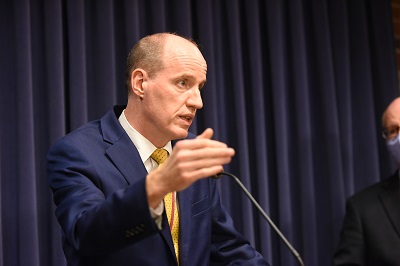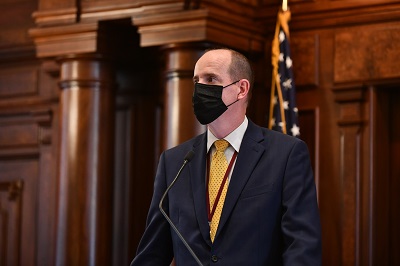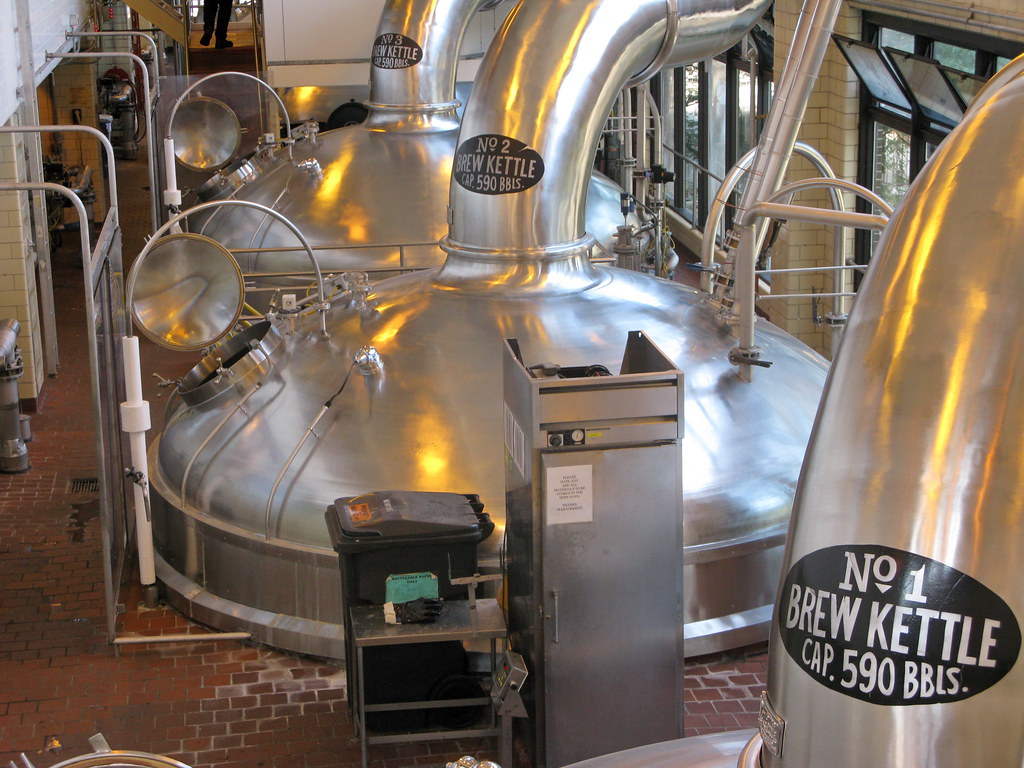- Details
- Category: Press Releases
 SPRINGFIELD – State Senator Bill Cunningham, who has been deeply involved in negotiations on a piece of legislation meant to spark Illinois’ renewable energy sector and preserve and create tens of thousands of jobs, celebrated the measure’s final passage through the General Assembly.
SPRINGFIELD – State Senator Bill Cunningham, who has been deeply involved in negotiations on a piece of legislation meant to spark Illinois’ renewable energy sector and preserve and create tens of thousands of jobs, celebrated the measure’s final passage through the General Assembly.
“This ambitious plan would make Illinois a national leader in fighting climate change and creating jobs in the clean energy economy,” said Cunningham, a Democrat who represents portions of Chicago and the southwest suburbs. “This legislation has been years in the making, and I want to thank both the labor and environmental communities for their passion and dedication in getting it across the finish line.”
The legislation, Senate Bill 2408, sets an ambitious goal of transitioning Illinois’ electric generation to 100% clean energy by 2050 and 50% renewable energy by 2040. It creates a firm schedule requiring coal, oil, and gas-based power plants to close or repurpose, addressing a major contributor to global warming. In order to reach these goals, it more than doubles the state’s budget for renewable energy, creates new workforce training programs, and allows for the construction of two renewable energy transmission lines.
- Details
- Category: Press Releases
 SPRINGFIELD – State Senator Bill Cunningham, who has been deeply involved in negotiations on a piece of legislation meant to spark Illinois’ renewable energy sector and preserve and create tens of thousands of jobs, praised the legislation’s Senate passage.
SPRINGFIELD – State Senator Bill Cunningham, who has been deeply involved in negotiations on a piece of legislation meant to spark Illinois’ renewable energy sector and preserve and create tens of thousands of jobs, praised the legislation’s Senate passage.
“This plan would make Illinois a national leader in fighting climate change,” said Cunningham, a Democrat who represents portions of Chicago and the southwest suburbs. “It also will help transition our energy workforce from fossil fuels to renewables earlier than any other state, giving those workers a distinct advantage in training and experience.”
The legislation, Senate Bill 18, sets an ambitious goal of transitioning Illinois’ electric generation to 100% renewable energy by 2050 and 50% renewable energy by 2040. It creates a firm schedule for closing coal, oil, and gas-based power plants, which are a major contributor to global warming. In order to reach these goals, it more than doubles the state’s budget for renewable energy, creates new workforce training programs, and allows for the construction of two renewable energy transmission lines.
- Details
- Category: Press Releases
 CHICAGO – Local libraries will see nearly $300,000 in improvements and service upgrades, State Senator Bill Cunningham announced Thursday.
CHICAGO – Local libraries will see nearly $300,000 in improvements and service upgrades, State Senator Bill Cunningham announced Thursday.
“Libraries have become an even more vital resource for many families during the pandemic,” said Cunningham, a Democrat who represents portions of Chicago and the southwest suburbs. “They’re about more than books – they provide high speed internet access and a wide variety of learning and entertainment resources for people of all ages.”
The funding received by local libraries is part of $18.1 million in grants awarded to 638 public libraries across the state. For more than 40 years, the Illinois Public Library Per Capita and Equalization Aid Grants Program has helped public libraries with a low library tax base to ensure a minimum level of funding for library services.
- Details
- Category: Press Releases
 SPRINGFIELD – A newly signed law sponsored by State Senator Bill Cunningham will make it easier for small breweries, meaderies, and winemakers to sell their products at local grocery and liquor stores, reaching customers more easily.
SPRINGFIELD – A newly signed law sponsored by State Senator Bill Cunningham will make it easier for small breweries, meaderies, and winemakers to sell their products at local grocery and liquor stores, reaching customers more easily.
“Local craft breweries, wineries, and meaderies have become very popular, and their customers would like to be able to buy their products at local grocery stores,” said Cunningham, a Democrat who represents portions of Chicago and the southwest suburbs. “Our system was not set up for small producers, which is why we need this change.”
The law allows these businesses to distribute their products to local bars, grocery stores, and liquor stores directly rather than through a third party. Under current Illinois law, most companies that produce alcohol have to sell their products to local grocery and liquor stores through a third-party distributor. Tracing back to the post-prohibition era, this setup is meant to help prevent the unregulated sale of alcohol and aid in the collection of alcohol-related taxes. It is still employed by almost every state in the U.S.
More Articles …
Page 18 of 72



